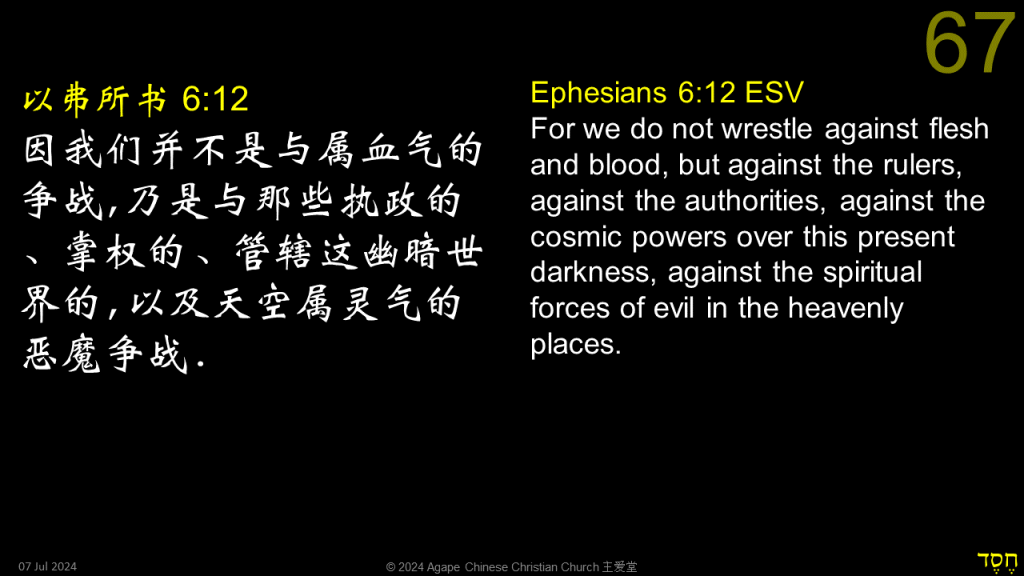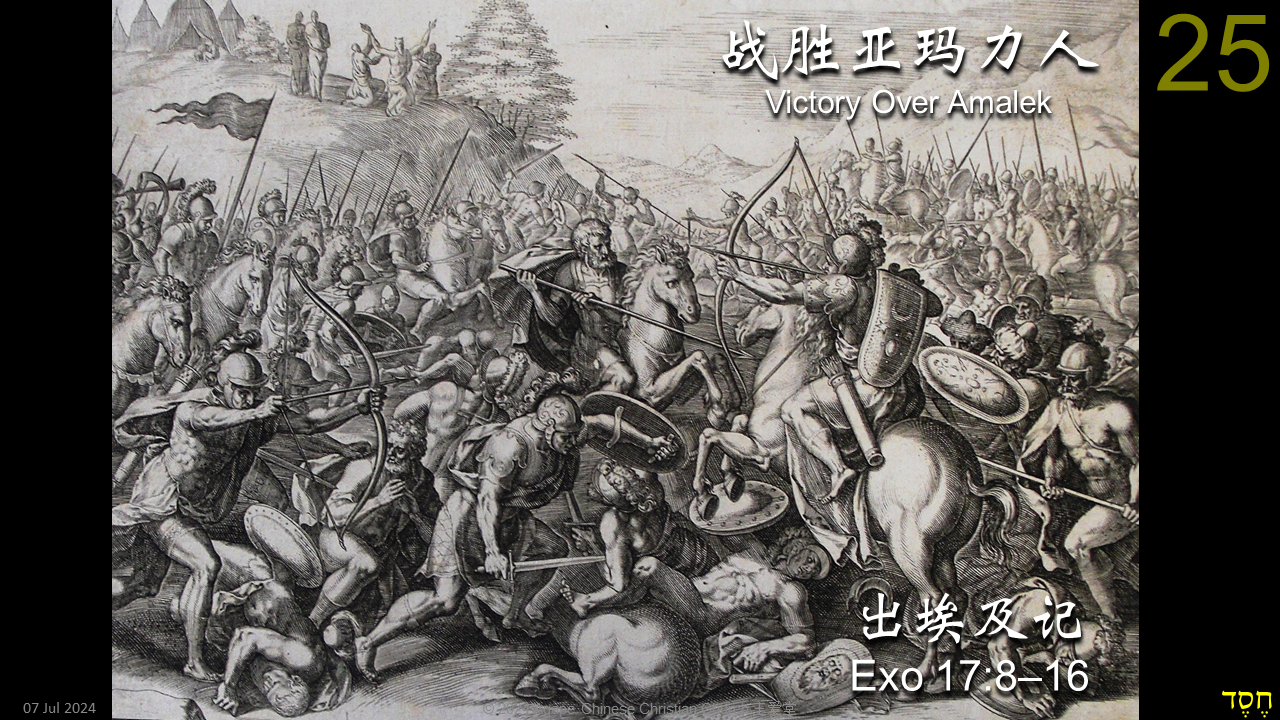战胜亚玛力人 Victory Over Amalek
出埃及记 Exo 17:8–16
Remember these points
I put these points at the top of my sermon-prep template to remind myself every week:
- Show that main point of passage relates to Jesus and his saving work
- (1 Cor 1:18) A truly gospel-centred message will not be acceptable in a synagogue or mosque
- Did I proclaim the gospel as the headline news of the sermon, rather than as a “by the way…”?
- Unbelievers are called to repent, believe, and be saved
- Believers are encouraged to abandon their old self, renew their minds, put on the new self in Christ
- Preach simple sermons, so that God’s people can see Christ more clearly and love him more dearly
News

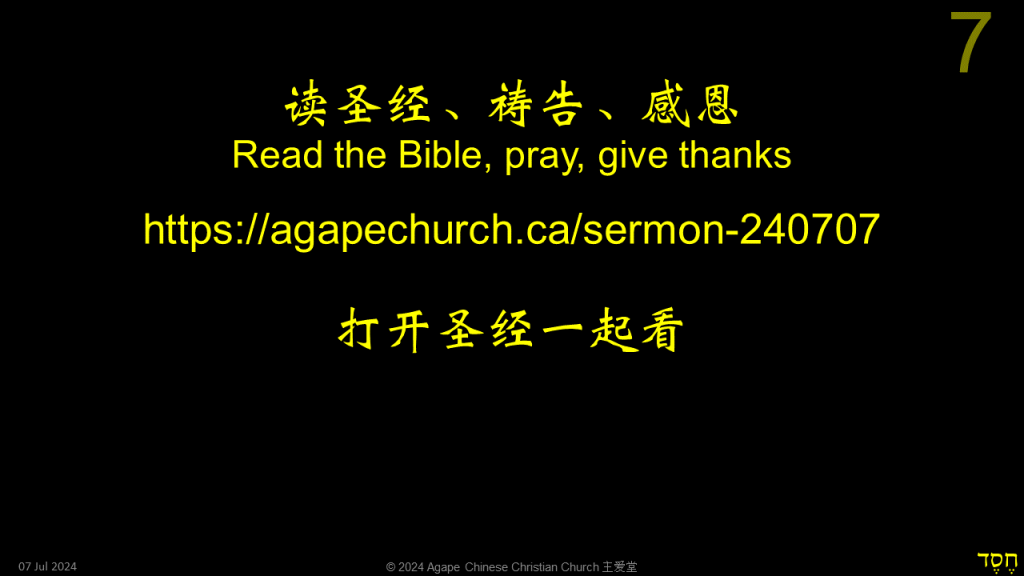
Passage
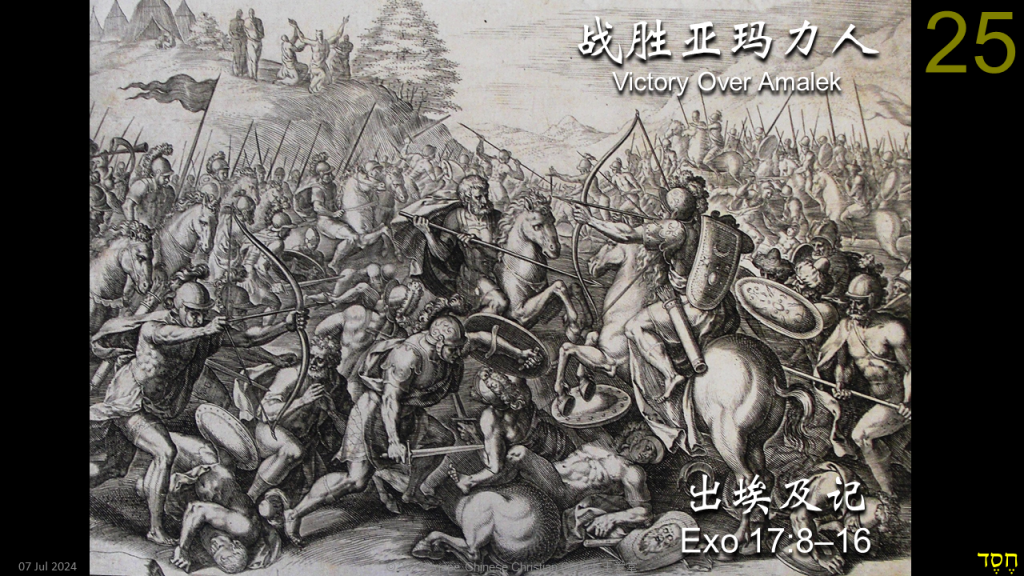
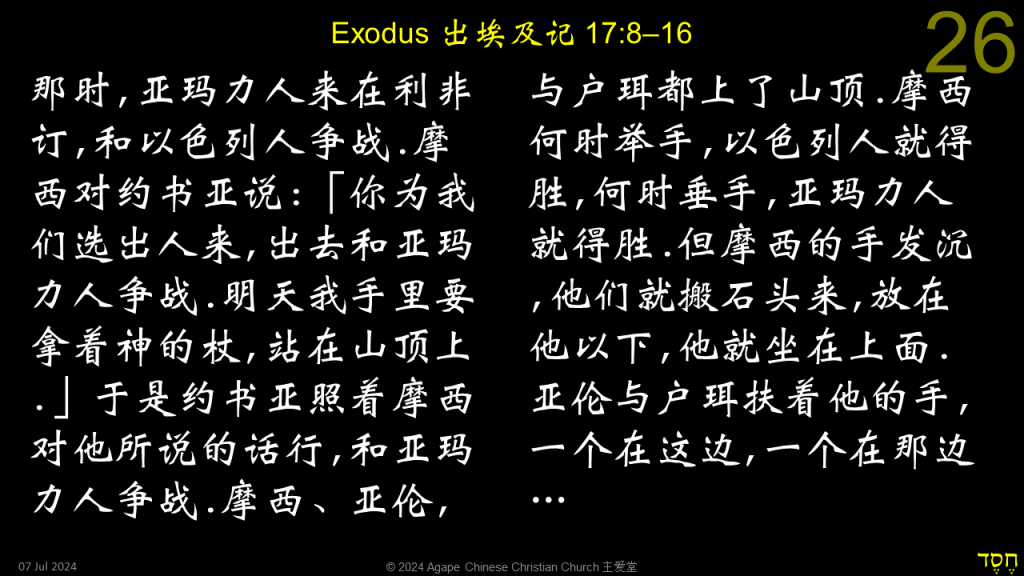
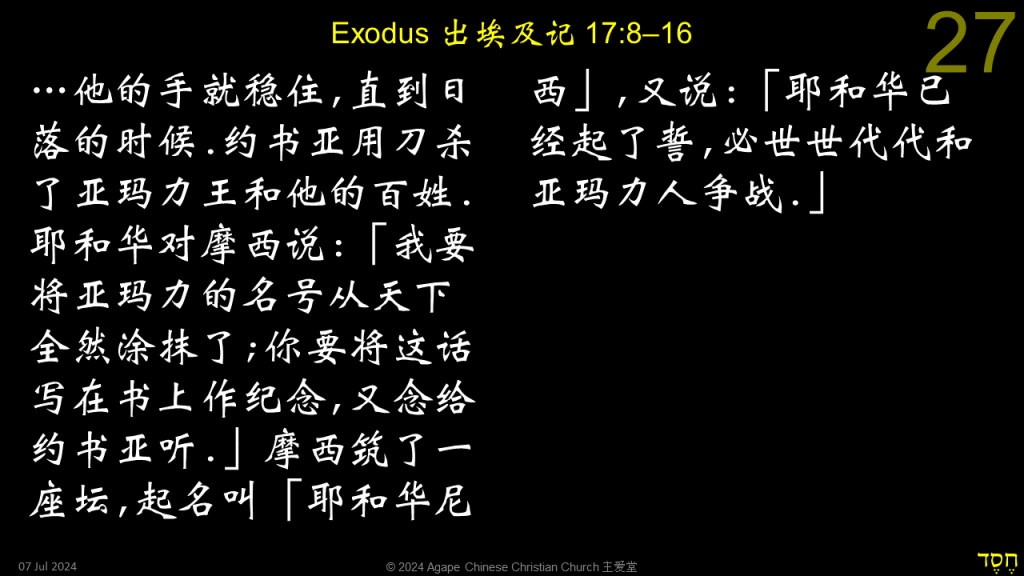
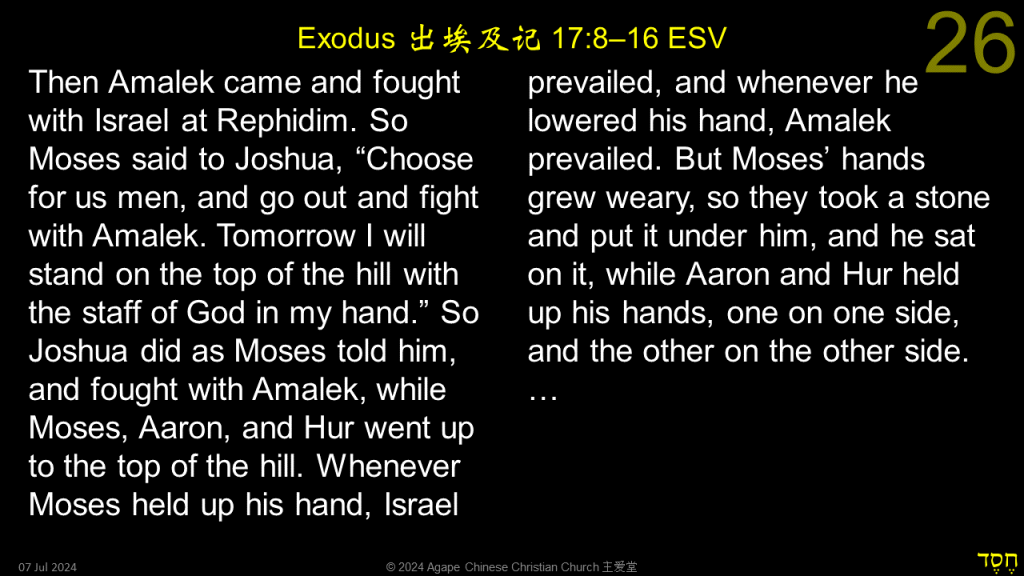
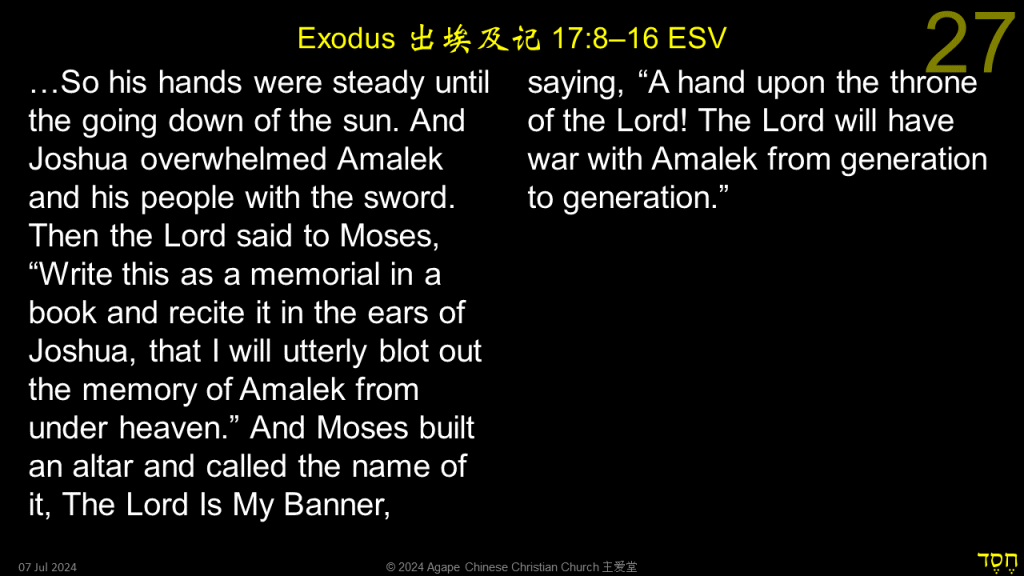
Outline

Section 1 亚玛力人 Amalek 17:8–9
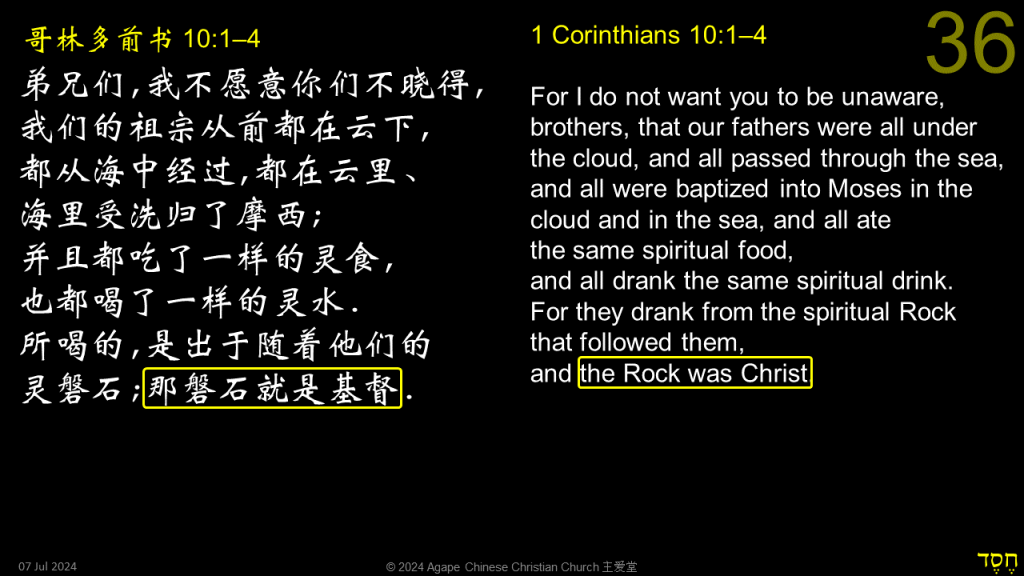
This slide is from the last time we looked at Exodus (before the Retreat).
The passages shows how the NT viewed the events at Raphidim (Exo 17:1–7).
People often read an OT passage and say, “This must be Christ!” Quite often, that’s not correct. But in this case with Moses hitting the rock at Rephidim, we can say, “That rock was Christ.”
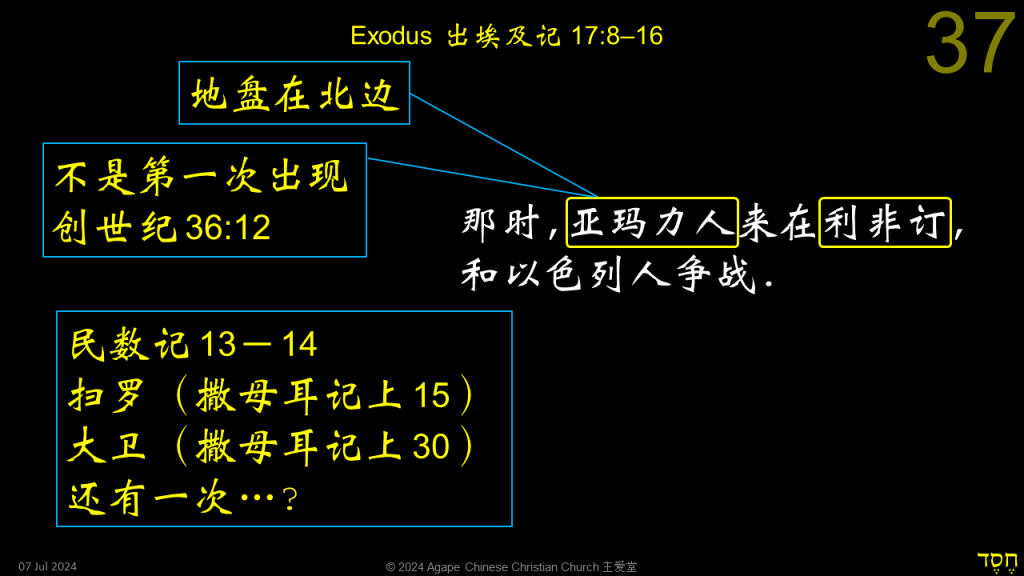
This isn’t the first time we see Amalek (or Amalekites).
They were mentioned back in Gen 14.
In Gen 36:12, we learned that Amalek is a descendant of Esau.
Other appearances of Amalek:
- In Num 14, just as Israel was about to go into Canaan
- In 1 Sam 15, when Saul disobeyed God and refused to wipe out Amalek
- In 1 Sam 30, when David defeated Amalek
- There is one more time in the OT, when this old enemy appeared again. Any ideas…?
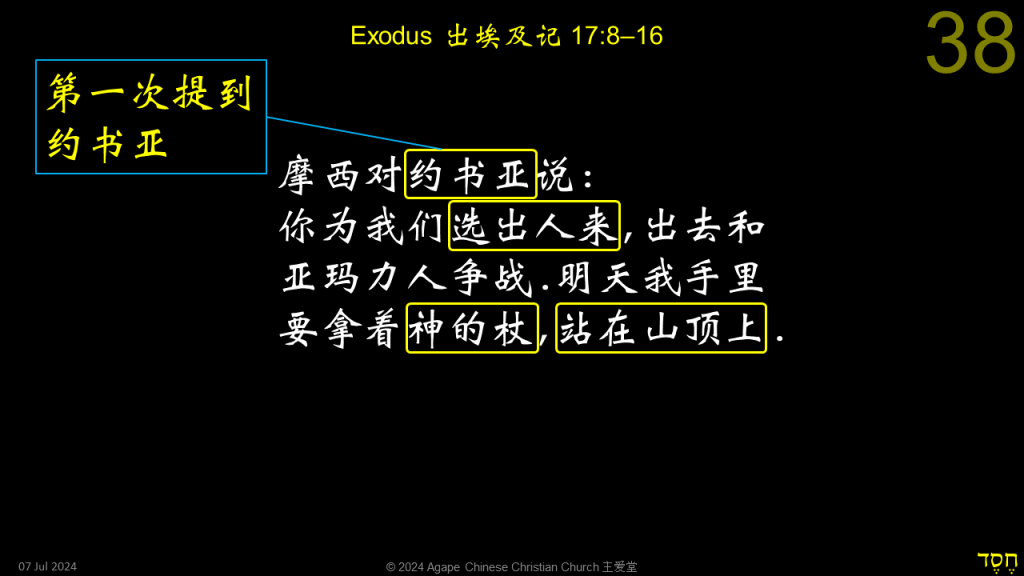
First time Joshua is mentioned.
We have no clue who he is at this point; only later were the detailed filled in.
The selecting of fighters most likely means Joshua was choosing men who were not afraid and more or less able to fight. Remember they were slaves in Egypt, and not likely trained soldiers or even have suitable weapons.
This is the same staff that Moses used in Egypt for the plagues, and for parting the Red Sea.
We can assume that God gave these instructions to Moses, even though the instructions weren’t written down explicitly.
Section 2 作战 The Battle 17:10–11
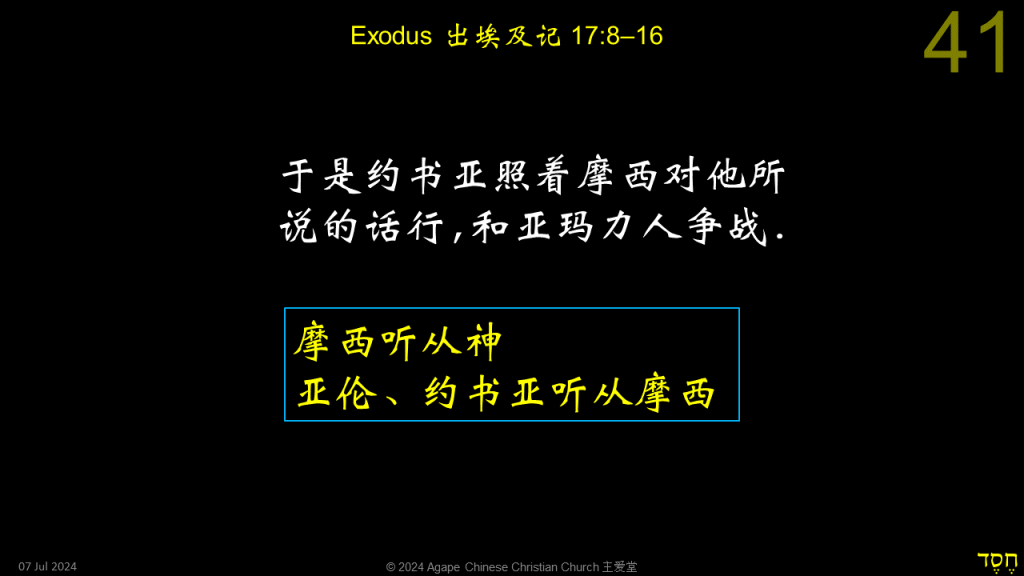
God instructed Moses, Moses instructed Joshua.
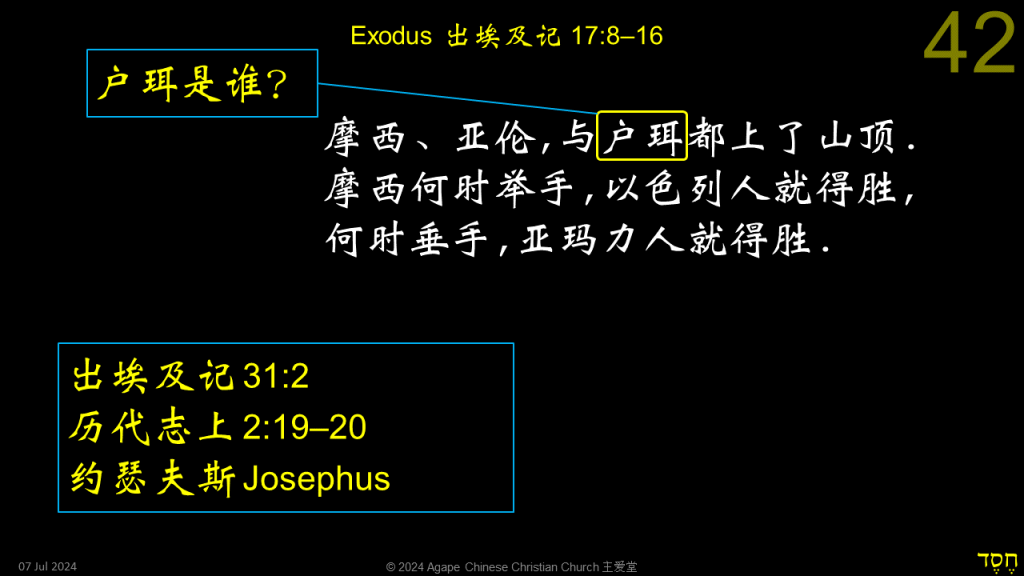
We now have three people on the hilltop: Moses, Aaron, Hur.
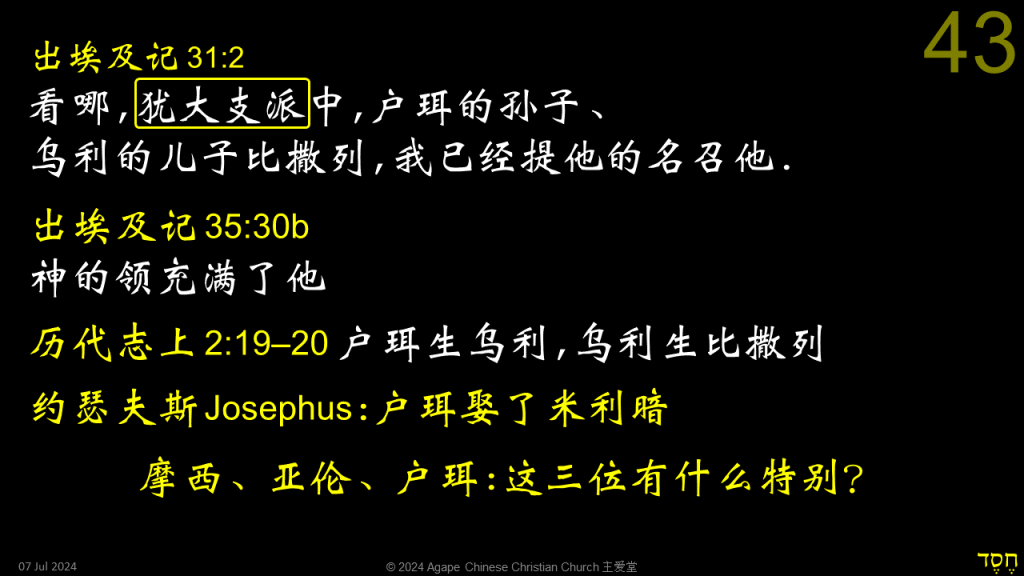
We can’t be certain who Hur is. Here are some clues (we also can’t be sure that every mention of Hur is of the same person):
- 1 Chron 2:19–20 mentioned Hur, whose grandson was Bezalel, the supervising craftsman for building the tabernacle (Exo 25–40).
- Exo 31:2 tells us Hur is of the tribe of Judah.
- Josephus (约瑟夫斯) said Hur married Miriam (elder sister of Moses). This would make Hur the brother in-law of Moses.
- In Exo 24:14, we see Hur acting as a judge in Moses’ absence, so Hur must have been an elder in Israel.
A good (and interesting) way to see the significance of these 3 on the hill:
What’s special about these three people?
- Hur is from tribe of Judah, where kings will arise later.
- Aaron will be future first high priest of Israel, and his descendants are the Levite priesthood.
- Moses? He is the prophet par excellence.
- All three offices together culminate in Jesus Christ: our ultimate king, high priest, and prophet.
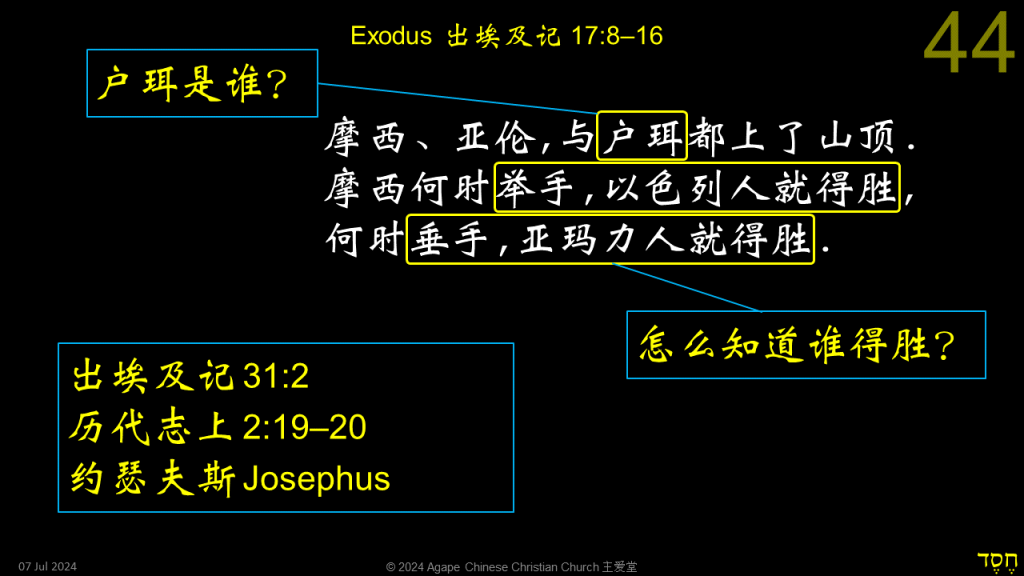
How do we know if one side is winning or losing?
This shows us that the Israelites had to actually fight; there were surely injured and dead soldiers.
Lessons
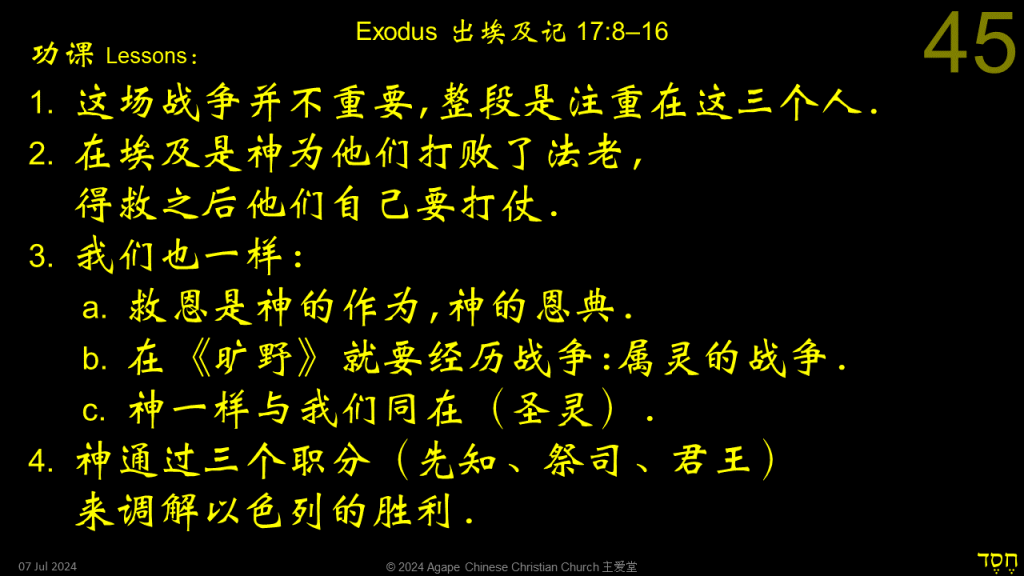
- The battle itself isn’t important, the entire passage is mainly about these 3 people.
- In Egypt, it was God who fought for them (they just had to stand still and watch).
It was God who defeated Pharaoh,
but after salvation (after leaving Egypt), they have to physically fight. - It’s the same for us:
- Salvation is the work of God, his grace and gift to us.
- In the “Wilderness,” (as we now find ourselves before we get to the Promised Land of God’s kingdom),
we will experience war (spiritual warfare). - But God is with us in this fight (the Holy Spirit).
- Through these three offices (prophet, priest, king), God mediated Israel’s victory.
Section 3 者合一 Three Together 17:12
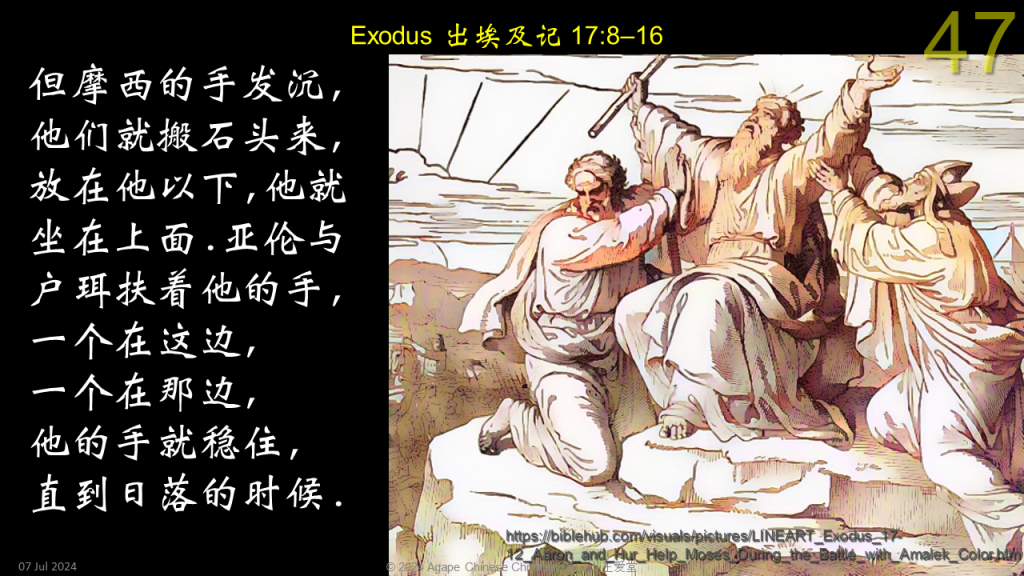
Picture is from Biblehub, depicting Aaron and Hur holding up Moses’ arms during the battle.
Who helped Israel to win? It was God, of course. However, Israel still had to get in there and fight.
Section 4 神的应许 God’s Promise 13–14
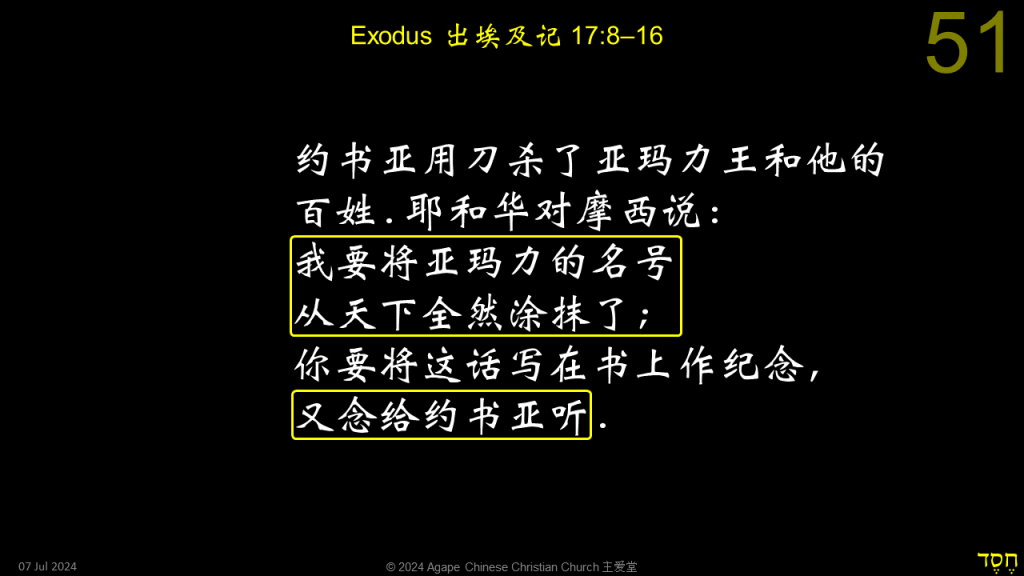
It’s very unfortunate how quickly they (and us) forget. Within two years, at the edge of Canaan, the Israelites would refuse to go in (because of Amalek and other people living in Canaan). They forgot how God won the battle for them.
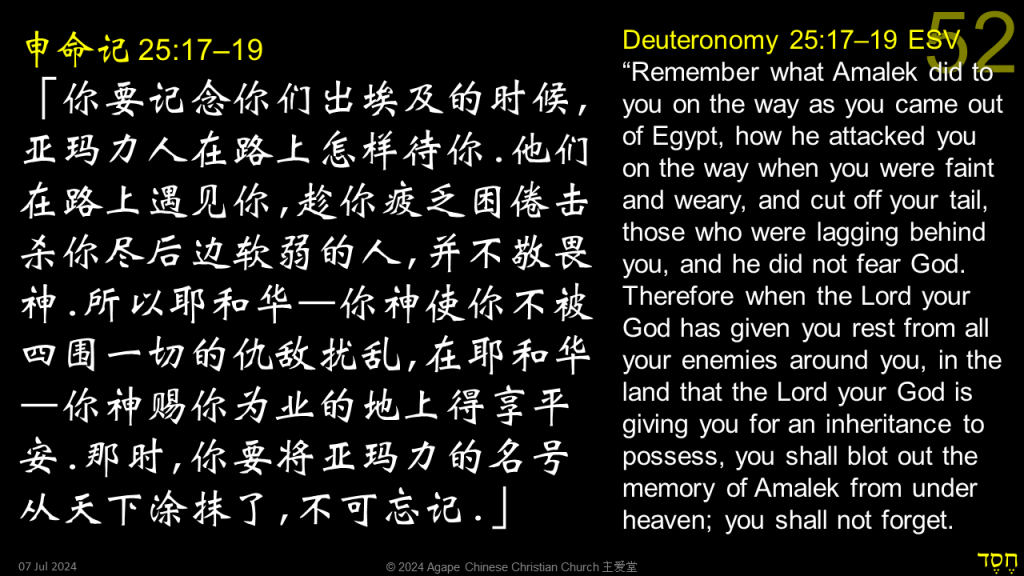
We see from Deut 25:17–19 how Amalek took advantage of the weakness of Israel. They didn’t even fight in an honourable way, but were picking off the sick and weak trailing behind at the end of the convoy.
Now we understand why God was so upset with Amalek.
Section 5 旌旗 Banner 17:15–16
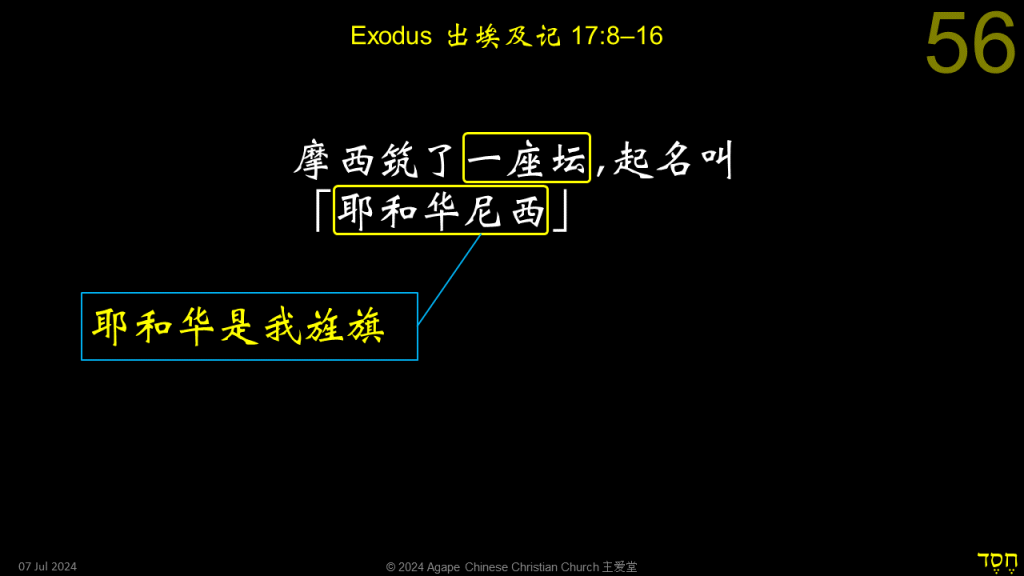
Moses built an altar (like Noah, Abraham, Isaac, Jacob), and named it “The LORD is my Banner.”
Majority of these altars were not for offering sacrifices, but for thanksgiving and as memorials.
CUV transliterates the Hebrew nisi, which means banner.
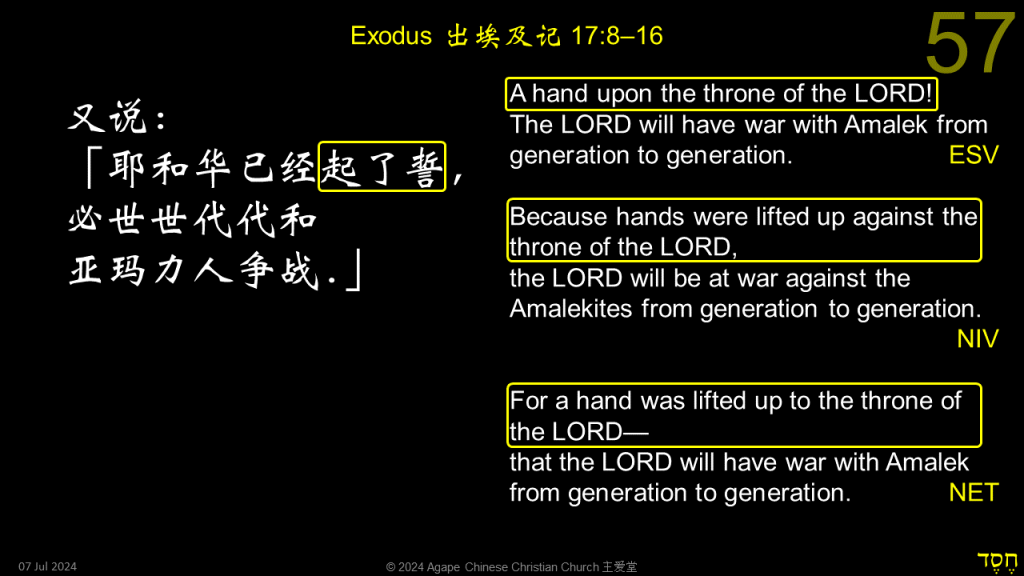
This last verse (Exo 17:16) has several difficult (hard to translate/understand) Hebrew words.
CUV simply skipped the difficulties. The excerpts from ESV, NIV, and NET all show the phrase “hand(s) upon the throne of God.”
This “hand against the throne of God” is probably referring to Amalek attacking Israel (an attack on Israel, God’s firstborn, is an attack on God). Amalek attacked the throne of God, so God will wipe them out.
与我有什么关系? So What?
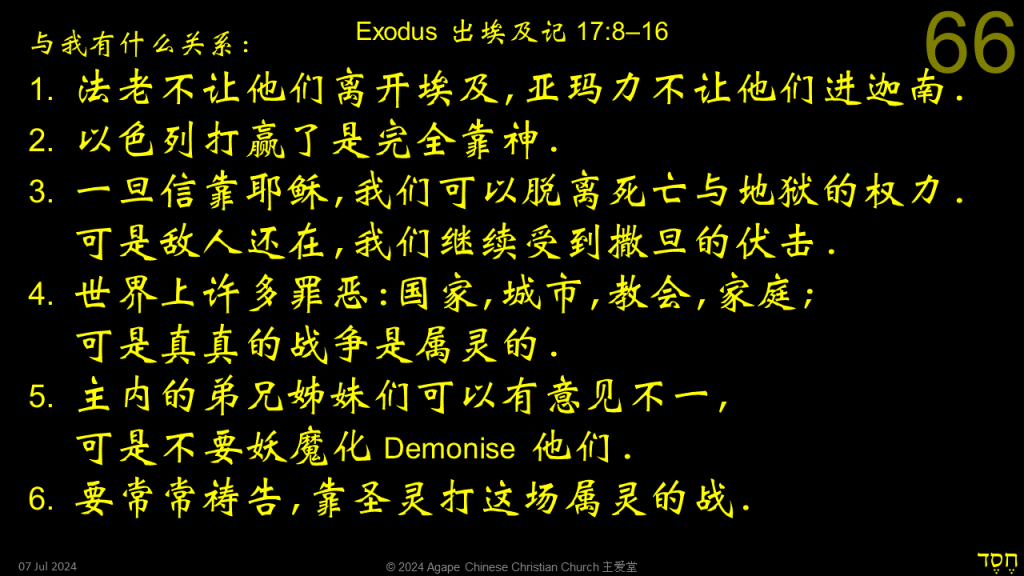
- Pharaoh won’t let them leave Egypt, Amalek won’t let them enter Canaan.
- Israel won the battle, all because of God.
- Once we believe in Jesus, we’re freed from the powers of death and hell.
But the enemy is still around, and we’ll continue to experience Satan’s ambushes. - There are lots of sin and evil in this world: country, city, church, family;
but the real battle is spiritual. - Brothers and sisters in Christ can disagree on many things,
but we should never demonise each other. - We need to pray constantly, as individuals and corporately as a church,
depending on the Holy Spirit to win this spiritual battle.
